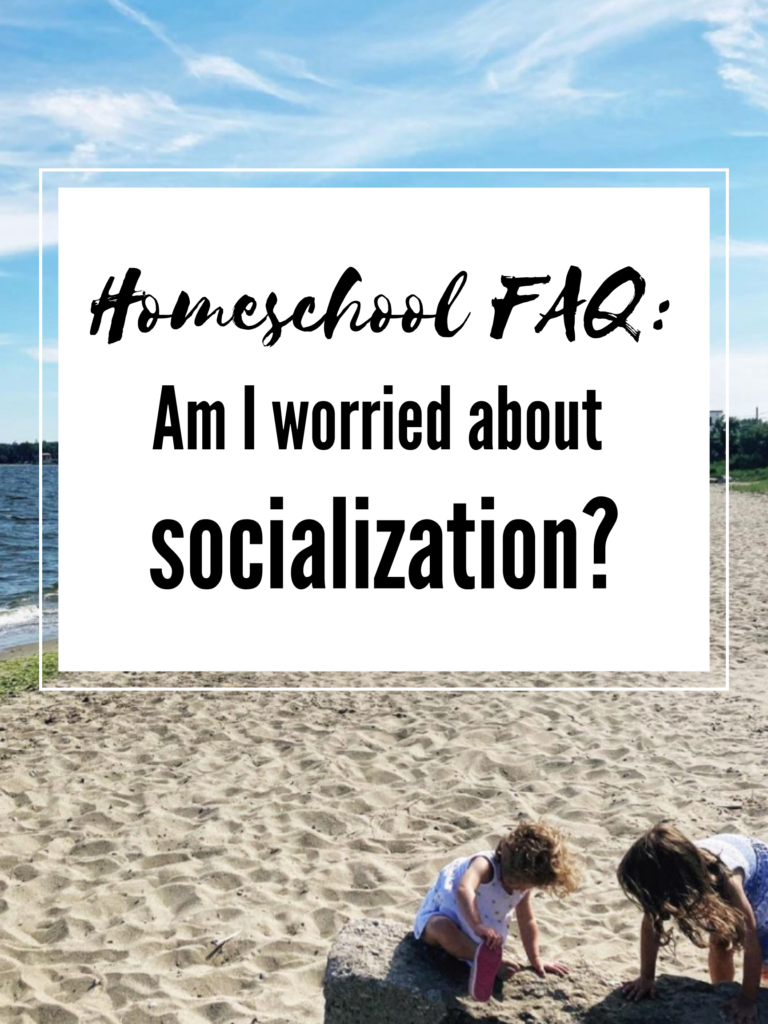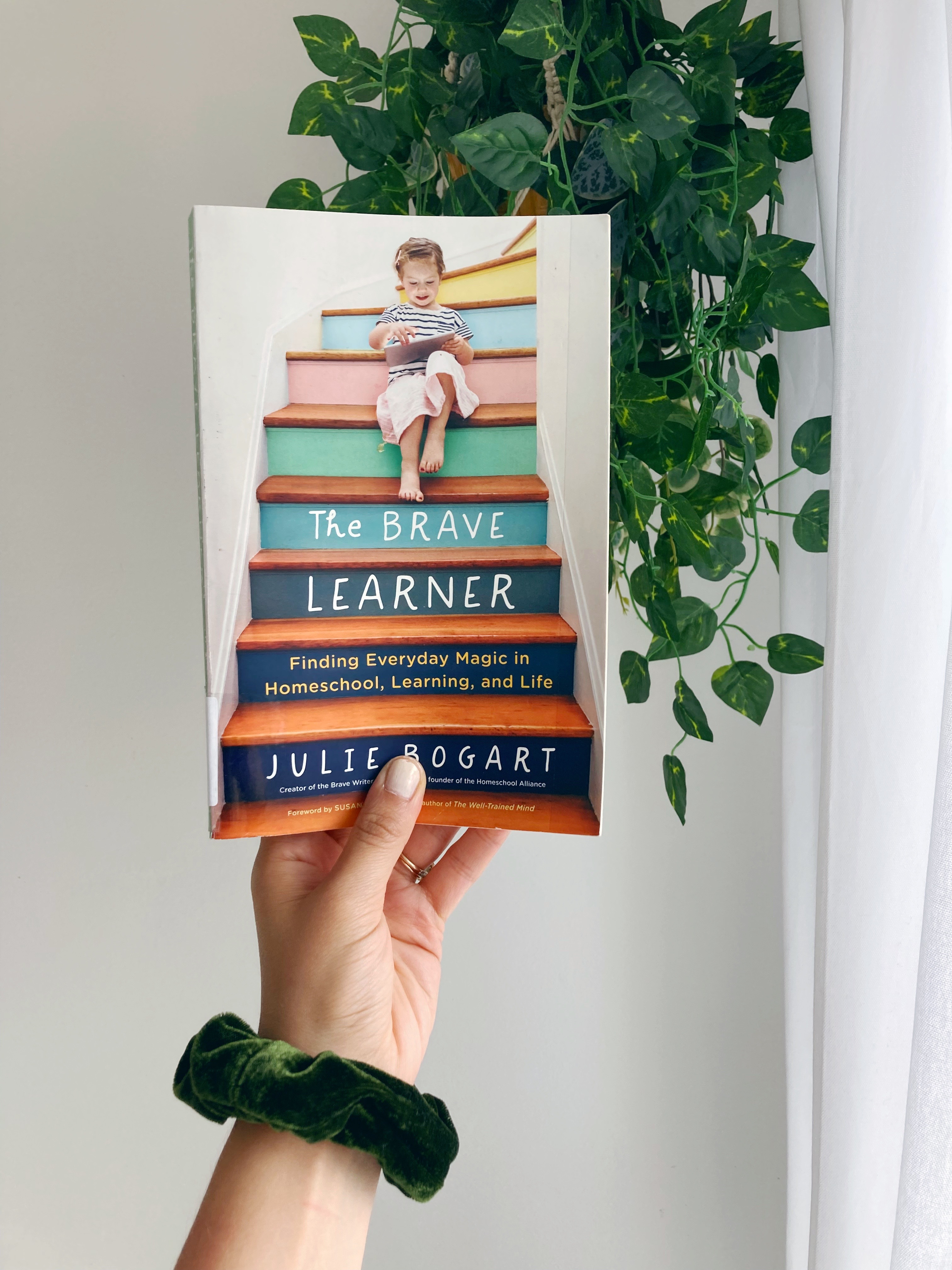Coming in hot with the “s” word. We haven’t been homeschooling for long but this question has already come up many many times. I feel like I get defensive immediately but I hope that changes over time as I get further into our journey. I understand why it is a question because when we think of kids socializing, school is clearly the source for the majority of children. Of course! However, that doesn’t make it the “right” and “only” way to socialize kids.
Before I get into my personal response to this, I highly recommend a few sources to really understand why socialization isn’t an issue. I am going to refer you to them because I can’t possibly cover it all in this post. I highly recommend checking out this video by The Ogelsby Ohana. She just a great job breaking it all down and also makes me laugh (in almost every video, really!) She’s amazing.
I also love this article by the Good and the Beautiful. The Good and the Beautiful also shared an awesome list with 50 ways to socialize your homeschooler. If you want a real “in your face” rant about homeschooling and socialization, this article nails it.
Here are a few quotes that stand out as some food for thought, too. I promise, I’ll get personal after this.
“I think the socializing aspects of school are ten times as likely to be harmful as helpful. The human virtues—kindness, patience, generosity, etc., are learned by children in intimate relationships, maybe groups of two or three. By and large, human beings tend to behave worse in large groups, like you find in school. There they learn something quite different—popularity, conformity, bullying, teasing, things like that. They can make friends after school hours, during vacations, at the library, in church.” -John Holt
“Don’t worry about socialization. Wherever people congregate, there is going to be interaction, socialization. Where is it written that it needs to be in schools?” -Mary Kay Clark
“The idea that children need to be around many other youngsters in order to be ‘socialized’ is perhaps the most dangerous and extravagant myth in education and child rearing today.” -Dr. Raymond Moore
“No one has to do anything in order to ‘socialize’ the children, or make them take part in the life of the group. They are born social; it is their nature.” -John Holt
“Homeschooled children benefit the community because they are not shaped by peers but by parents.” –Mary Kay Clark
“Forced association is not socialization.” -Adele Carroll
“Homeschoolers happily speak with more ease and poise because they don’t fear adults as authority figures. Their authority figures were always their loving parents, teachers and often their best friends; if your best friend is your teacher and authority figure, education is less stressful. –Rebbecca Devitt
“You hear the word “socialization” used frequently, that is what schools do best – they socialize children. No, they don’t. You learn to talk to a fragment of people your own age, you learn to envy, resent, and fear people older than you, and you learn to have contempt for people younger than you. They hardly exist.” -John Taylor Gatto
“The process of socialization is nowhere near complete at age five or six, when modern children start spending up to half their waking hours taking their cues from other people’s children. Because they accompany their parents’ daily routine, homeschooled kids spend plenty of time interacting with people of all ages, which I think most people would agree is a far more natural, organic way to socialize.” -Quinn Cummings
“I would always have to fight for social acceptance at school – and I would do just about anything to get it. When I was homeschooled my insecurities were overcome by parental love.” -Joshua Hesford
“My kids were much better at getting along with people of all ages when they were homeschooled and were able to be cheerful and outgoing in public and get along with their peers and friends. They learnt to interact with the world in a much more real way than being expected only to know how to communicate with other kids their age.” -Jenny Allen
“We agree that we want our children to be properly socialized; that’s why we homeschool. Homeschooling enables the kids to socialize properly. They grow up with people all day long and grow up with people in their homes, with people down the street and in the supermarkets. That’s why they’re well socialized.” -William and Susan McAulay
Okay, now… onto personal thoughts. Am I worried? Short answer: No. Long answer? Buckle up.
Willow is a social butterfly. She is my extroverted child and she gives my introverted self all sorts of anxiety. Ha! At nearly 4 years old, she talks with children and even adults with ease. She’ll introduce herself to anyone and can carry a conversation like no other. Why am I telling you this? Just to show you that even without any school, she is already more social than her own mother. She already puts herself out there and is eager to meet people. I have no fear that she is going to be a hermit simply because we are homeschooling.
As homeschoolers, we are not going to sit in our home all day long learning. No way! The world is our classroom! The grocery store! The library! The playground! The museum! And who will we see out in the wild world? People. Tons of people. People of all ages and backgrounds. She doesn’t need to be in a room with 30 kids her own age to socialize.
We’ll be joining a local co-op in the future and that will be one way we socialize with other homeschooling families.
We will be investing in local programs for homeschoolers at our local zoos, museums, aquariums, and heck, even sports organizations. Willow has already taken a gymnastics class and this company even offers a weekly homeschool program. She wants to play soccer, so we will sign her up for the community team. If she wants to take dance, we will support her. If she wants to take an art class, we will support her. Community theater? Sure, kid! Wherever her interests lead her, there is a class out there that we can sign her up for. We want her to follow her interests and find her passions. And yes, these things will lead to socialization! Organized sports and classes = other children. The same will go for Fiona when she is older and gets started.
We will be having weekly playdates and lessons and projects in our own homeschool pod with friends who also homeschool. Heck, we already do that minus the homeschool part. We see friends at least 2-3 times a week.
My kids will be going to events, field trips, dances, proms, and yes, even a graduation ceremony eventually through our state’s homeschool organization. There will be SO MUCH offered to us, it may be hard to say no to things so that we can actually be home and do sit down work.
Something else I want to point out that I feel in my heart is the idea of children being “afraid” of adults or feeling unequal. I can remember in my own experience going to school feeling nervous around adults and people of authority. I do believe that this stems from the school system. Teacher says something and you do it. End of discussion. I was a great student. I didn’t disrupt class. Why? Out of fear, really. I didn’t want to get in trouble!! I am not saying I want my children to be disruptive and disrespectful, but I am trying to point out that I do not want my kids to fear older generations. I want my kids to socialize well with kids their age, kids younger than them, kids older than them, and yes, adults. Socialization in the real world vs. an institutionalized system will provide that.
Alongside socialization, I also want to quickly talk about the negative sides of “socialization” in schools. If my kids mesh well with someone in our co-op group, we make an effort to see them outside of co-op. They build organic relationships with the people they choose vs. a lot of 30 kids by chance. And the thing is, when you are in school with certain kids, sometimes you won’t mesh with someone. You may get bullied. And there is no escaping that. I can attest to this because I was bullied in junior high and had to transfer schools because of it. It was damaging to my self-esteem and to escape, I was literally pulled out of one school system and into another. And I am grateful for my parents who did pull me out because it was scary, and quite frankly, scarring to stay put. With homeschooling, if someone does bully you in a co-op or in a certain situation, you can make damn sure you don’t stick around or stay put in that situation. With minimized teasing and bullying, my kids are free to be who they are without the fear of being labeled “different.” They grow in a loving, nurturing, and uplifting environment which is more likely to lead to confident adults who are comfortable in their own skin.
That was a little side-tracked, but just wanted to cover everything that goes through my head when people ask about socialization.
Bottom line is: No, I am not worried. My husband is not worried. And when people in my life ask or worry, I encourage them to do a quick Google search and dig deeper. If someone is worried (and not saying these people are wrong to ask), it probably just means they are uneducated on the topic. I was! It was a concern I had, too! But once I dove in and did my research, I realized just how wrong and ignorant I have been. And again, that is okay. The unknown is frightening and can cause unease and doubt. That’s what veteran homeschoolers with inspiring podcasts and blog posts are for. They ease your worries with the truth.
But now? I have done my research and feel confident in this decision. I would never make a decision for my kids’ future if I did not feel 100% confident that it would lead to my children being well-educated, kind human beings who know how to interact with the people and world around them. As parents, I know we all feel that. We do what feels right by our family. This feels right to us and the “s” word isn’t going to scare us anymore. x




